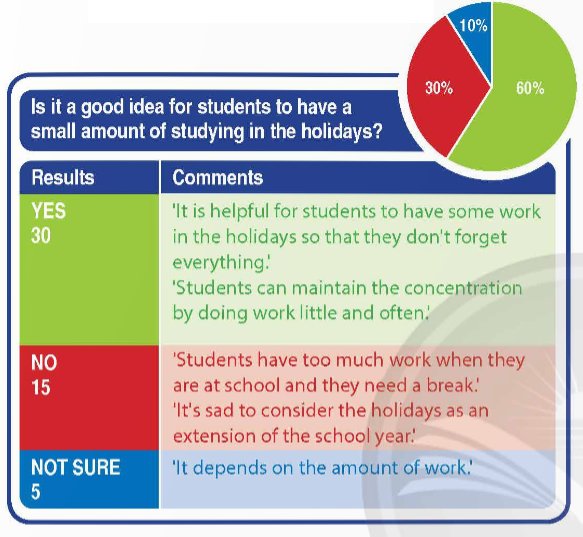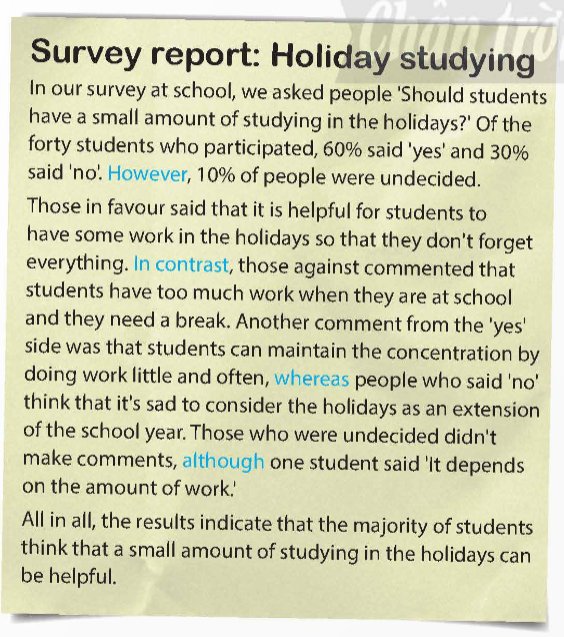THINK! Do you think that students should have a small amount of studying in the holidays? Why / Why not?
Writing: A report on an opinion survey
THINK! (SGK Friends Plus - Trang 25)
Thảo luận (1)
Activity 1 (SGK Friends Plus - Trang 25)
Read the survey results and the report and answer the questions.1. There is one error in the report. What is it?2. Do you agree or disagree with the majority of people in this survey?
Đọc tiếp
Read the survey results and the report and answer the questions.
1. There is one error in the report. What is it?
2. Do you agree or disagree with the majority of people in this survey?


Thảo luận (1)Hướng dẫn giải1. The report has an incorrect number of people participating in the survey (50 people participated in the survey), leading to inaccurate data.
(Báo cáo ghi sai số lượng người tham gia khảo sát (50 người tham gia khảo sát) dẫn đến số liệu không chính xác.)
2. I agree with the majority of people in this survey who believe that a small amount of studying in the holidays can be beneficial for students. As mentioned in the survey report, studying during the holidays can help students retain knowledge and skills, prevent forgetting, and maintain concentration. It is important to strike a balance between relaxation and academic work to ensure continuous learning and development.
(Tôi đồng ý với phần lớn những người trong cuộc khảo sát này tin rằng việc học tập một chút trong những ngày nghỉ có thể mang lại lợi ích cho học sinh. Như đã đề cập trong báo cáo khảo sát, việc học tập trong kỳ nghỉ có thể giúp học sinh ghi nhớ kiến thức và kỹ năng, chống quên và duy trì sự tập trung. Điều quan trọng là phải đạt được sự cân bằng giữa thư giãn và học tập để đảm bảo học tập và phát triển liên tục.)
(Trả lời bởi datcoder)
Activity 2 (SGK Friends Plus - Trang 25)
Study the Key Phrases. Which of the phrases is not in the report?
KEY PHRASES
Presenting the results of a survey
Those in favour said that ...
Those against commented that …
People who said ‘yes’ / ‘no’ think that ...
All in all, the results indicate that ...
Most students / the majority of students …
An equal number of people thought that ...
Thảo luận (1)Hướng dẫn giảiPhrase “An equal number of people thought that ...” is not in the report.
(Cụm từ “Một số lượng tương đương người nghĩ rằng…” không có trong báo cáo.)
(Trả lời bởi datcoder)
Activity 3 (SGK Friends Plus - Trang 25)
Study the expressions in blue in the report. Rewrite sentences 1-4. Include the words in brackets.1. Most students don’t like exams. Many teachers think they are useful. (whereas)2. I like trying out new things. I don’t always like the things I try. (although)3. I find maths and science really easy. Subjects like literature and English are difficult for me. (In contrast)4. I think exams are important. I think we have too many. (However)
Đọc tiếp
Study the expressions in blue in the report. Rewrite sentences 1-4. Include the words in brackets.
1. Most students don’t like exams. Many teachers think they are useful. (whereas)
2. I like trying out new things. I don’t always like the things I try. (although)
3. I find maths and science really easy. Subjects like literature and English are difficult for me. (In contrast)
4. I think exams are important. I think we have too many. (However)
Thảo luận (1)Hướng dẫn giải1. Most students don’t like exams, whereas many teachers think they are useful.
(Hầu hết học sinh không thích các kỳ thi, trong khi nhiều giáo viên cho rằng chúng hữu ích.)
2. Although I like trying out new things, I don’t always like the things I try.
(Mặc dù tôi thích thử những điều mới nhưng không phải lúc nào tôi cũng thích những điều tôi thử.)
3. I find maths and science really easy. In contrast, subjects like literature and English are difficult for me.
(Tôi thấy toán và khoa học thực sự dễ dàng. Ngược lại, những môn như văn học và tiếng Anh lại khó đối với tôi.)
4. I think exams are important; however, I think we have too many.
(Tôi nghĩ kỳ thi rất quan trọng; tuy nhiên, tôi nghĩ chúng ta đang có quá nhiều.)
(Trả lời bởi datcoder)
Activity 4 (SGK Friends Plus - Trang 25)
Follow the steps in the Writing Guide.

Thảo luận (1)Hướng dẫn giảiSurvey report: School exams
In our survey in our class, we asked people ‘Do we really need school exams every year?’ Of the sixty students who participated, 50% said ‘yes’ and 40% said ‘no’. However, 10% of people were undecided.
Those in favour said that these annual tests allow schools to assess student’s progress and identify areas which require improvement. According to 50 per cent of respondents, examinations help them measure their academic development and understand where further effort is needed. In contrast, some claim that frequent assessment leads to stress and anxiety among young learners who lack confidence in their abilities. Another comment from the ‘yes’ side was that examinations encourage hard work and discipline among students as they prepare for upcoming testing sessions, strengthening their learning skills, whereas people who said ‘no’ question whether the proficiency gauged from annual exams translates into employability once they graduate because most job sectors do not rely solely upon test scores. Those who were undecided didn’t make comments.
All in all, the results indicate that the majority of students think that school examinations play a vital role in evaluating student achievement.
Tạm dịch:
Trong cuộc khảo sát trong lớp, chúng tôi đã hỏi mọi người “Chúng ta có thực sự cần các kỳ thi ở trường hàng năm không?” Trong số 60 học sinh tham gia, 50% nói “có” và 40% nói “không”. Tuy nhiên, 10% số người vẫn chưa quyết định.
Những người ủng hộ cho rằng những bài kiểm tra hàng năm này cho phép các trường đánh giá sự tiến bộ của học sinh và xác định những lĩnh vực cần cải thiện. Theo 50% số người được hỏi, các kỳ thi giúp họ đo lường sự phát triển học tập của mình và hiểu được những điểm cần nỗ lực hơn nữa. Ngược lại, một số người cho rằng việc đánh giá thường xuyên sẽ dẫn đến căng thẳng và lo lắng ở những học sinh thiếu tự tin vào khả năng của mình. Một nhận xét khác từ phía nói ‘có’ là các kỳ thi khuyến khích sự chăm chỉ và kỷ luật của học sinh khi họ chuẩn bị cho các kỳ kiểm tra sắp tới, củng cố kỹ năng học tập của họ, trong khi những người nói ‘không’ đặt câu hỏi liệu trình độ đánh giá từ các kỳ thi hàng năm có chuyển thành khả năng có việc làm hay không khi họ tốt nghiệp vì hầu hết các lĩnh vực công việc không chỉ dựa vào điểm kiểm tra. Những người chưa quyết định đã không đưa ra ý kiến.
Nhìn chung, kết quả cho thấy đa số học sinh cho rằng các kỳ thi ở trường đóng vai trò quan trọng trong việc đánh giá thành tích của học sinh.
(Trả lời bởi datcoder)